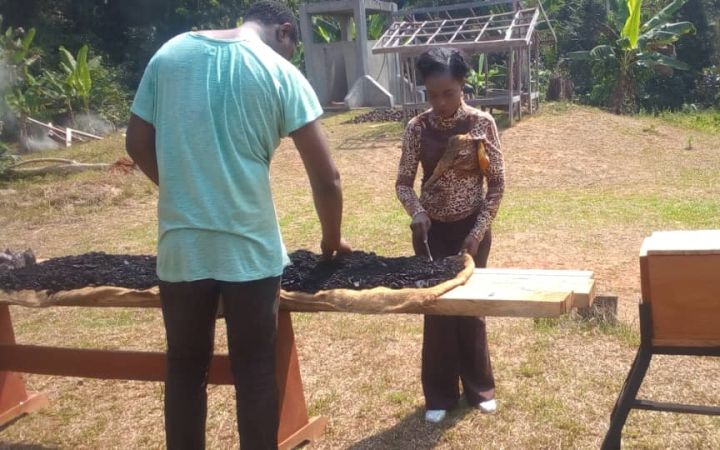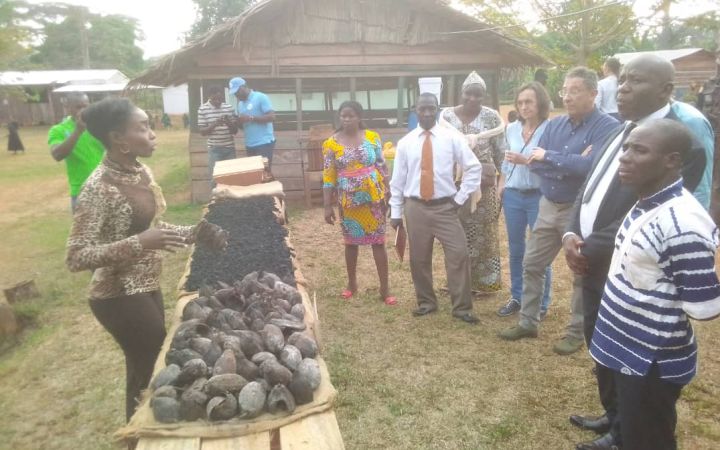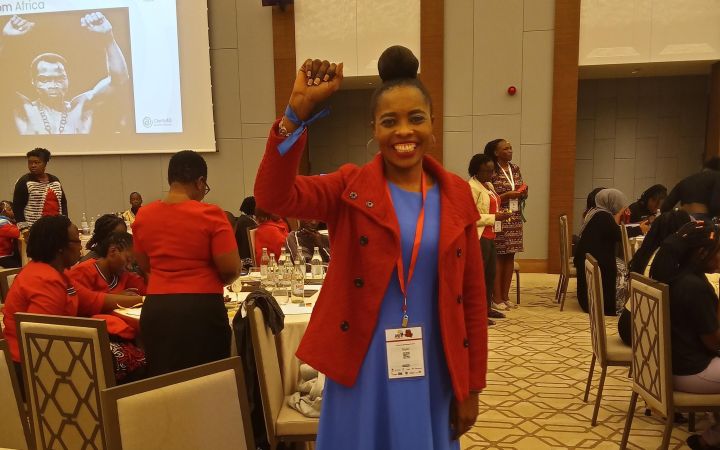Reshaping Gender Equality, Entrepreneurship, and Environmental Sustainability in Cameroon
- Vannie Djounguep from Cameroon is a gender equality advocate, entrepreneur, and environmentalist. She founded an association to empower women in the informal sector and promote environmental sustainability, specifically biochar cocoa.
- Joining the Advancing Gender Equality and Women Empowerment 2023 Entrepreneurship and Financial Literacy Training Programme fueled her resilience and determination to overcome obstacles and achieve her entrepreneurial goals.
- Vannie aims to use her new knowledge to improve financial literacy among female entrepreneurs and introduce biochar cocoa production to address climate change and poverty in Cameroon.
Vannie Djounguep is reshaping gender equality, entrepreneurship and environmental sustainability in Cameroon and beyond. An author, gender expert and sociologist, Vannie is also the founder and executive director of an organization that advocates for gender equality and environmental protection, especially in the informal sector.
Recently, she participated in the UNITAR Advancing Gender Equality and Women Empowerment 2023 Entrepreneurship and Financial Literacy Training Programme, organized in collaboration with the United Nations Development Programme (UNDP) and generously funded by the Government of Canada.
ENTREPRENEURIAL OBSTACLES AND GROWTH
As an entrepreneur in Cameroon, Vannie has faced many challenges. One hurdle was the burden of heavy taxation, which strained her finances and hindered the growth of her business. It led her to establish an association as a more cost-effective option to manage.
Although the government of Cameroon aims to create a business-friendly environment for entrepreneurship, as indicated in its 2020 National Development Strategy (in French), taxation is cited as a primary obstacle to entrepreneurship in a 2016 survey by the National Institute of Statistics of Cameroon (in French). It is one reason why the informal sector continues to predominate in the country, absorbing over 90 per cent of the workforce (in French), according to the International Labour Organization.
As a woman, Vannie has also experienced gender-related biases and obstacles. Stereotypes influence how she has been perceived and treated in the business world. But she found inspiration from supportive friends and an encouraging mother who instilled faith with the words “You’ll find what you seek; keep pushing forward.” They fuel her resilience and determination to achieve her entrepreneurial goals.
It is important to have a strong conviction to resist the discouragement of others, as we all have our dreams that drive us to live.” – Vannie Djounguep (Cameroon), entrepreneur and UNITAR alumna
In part driven by these experiences, Vannie focuses especially on women in the informal sector, giving them the tools and resources they need to thrive in their ventures.
A DREAM COME TRUE
Vannie calls her UNITAR experience a dream come true. Having previously applied for a similar UNITAR programme without success, she was determined to make the most of this opportunity. Despite initial challenges with the EdApp online learning tool, she embraced it as a chance to improve her IT skills. Overall, she found the programme to be comprehensive, engaging and genuinely empowering.
“The discussion rooms were precious,” she says. “They allowed [us] to delve into [our] motivations for pursuing entrepreneurship.” Vannie also found it uplifting to have access to a dedicated coach for personalized teaching and training and to hear success stories from individuals who had overcome similar challenges.
Having faced limited access to credit and high financing costs, Vannie welcomed learning about potential investors and gaining links to useful websites. “These resources have expanded my understanding of the investment landscape and equipped me with the knowledge to seek potential investors for my entrepreneurial endeavours,” she says, hoping to use these to help her secure funding for her business.
AN ENTREPRENEUR’S IMPACT
Vannie is motivated to share her newfound knowledge with entrepreneurs in her community. She strongly believes in financial literacy as a crucial but often overlooked aspect of entrepreneurship and is determined to address this by teaching more women entrepreneurs in Cameroon how to make informed decisions about money.
We give to others, which is true, but we must not forget that to give, we need to be full; otherwise, we won’t have anything to give.” – Vannie Djounguep (Cameroon), entrepreneur and UNITAR alumna
Vannie is also a strong proponent of environmental sustainability, particularly in promoting biochar cocoa. Biochar, produced through the pyrolysis-based recycling of cocoa pod shells, has shown its potential in tackling climate change. Vannie envisions establishing a biochar cocoa firm to harness this innovation for the greater good and as a practical application of her training. Through this venture, she hopes to help alleviate poverty in Cameroon and combat climate change.
In her pursuits, Vannie embodies women’s empowerment and is a role model for others striving to make a tangible difference. Her diverse contributions to gender equality, entrepreneurship and environmental conservation are sure to inspire others to join her in creating a brighter and more equitable future for all.
ABOUT UNITAR
The United Nations Institute for Training and Research (UNITAR) is a dedicated training arm of the United Nations. In 2022, UNITAR trained over 395,000 learners around the world to support their actions for a better future. In addition to our headquarters in Geneva, we have offices in Hiroshima, New York and Bonn and networks around the world.
The Division for Prosperity is based in the Hiroshima Office and Geneva. We seek to shape an inclusive, sustainable and prosperous world through world-class learning and knowledge-sharing services on entrepreneurship, leadership, finance and trade, digital technologies, and nuclear disarmament and non-proliferation. We empower individuals from least-developed countries, countries emerging from conflict, and small-island developing states – especially women and young people – to bring about positive change.




